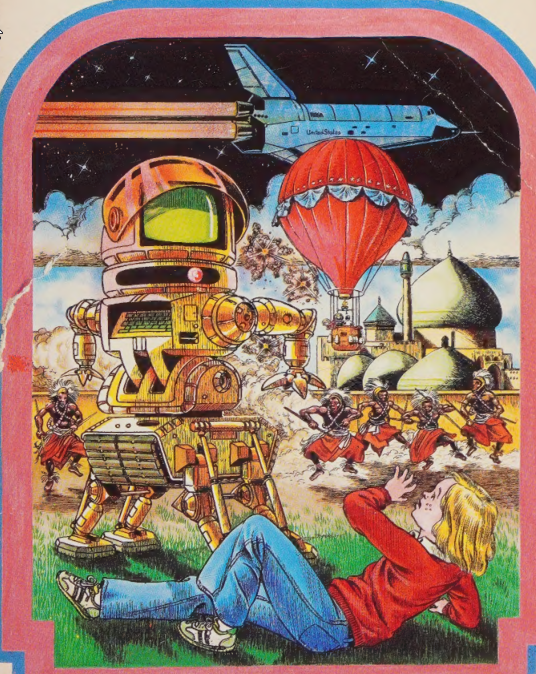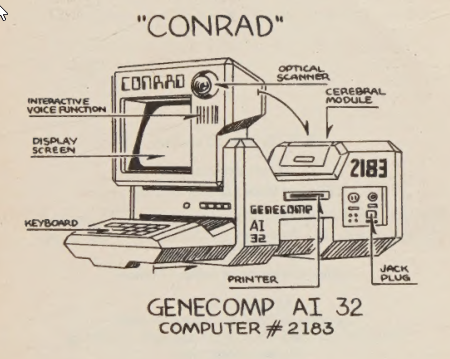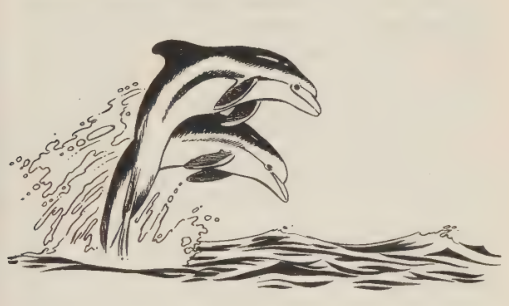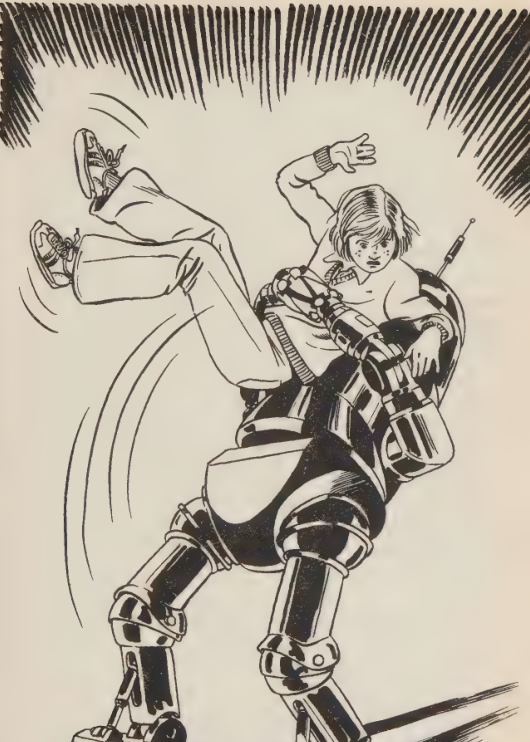created, & modified, =this.modified
tags:y2025computersretrooulipo
rel: When H.A.R.L.I.E. Was One by David Gerrold
Why I’m reading
I would read these types of tales when I was a kid.
There’s an appeal to retrofutures and how we conceived of the future of computers, so I thought this would be a fun, casual detour.

Some comments from kids aged 9-12, before book regarding this format of novel
- “I like these books because they are full of surprises. I can’t wait to read more!”
- “Makes you think thoroughly before making decisions”
- “I read five different stories in one night and that’s a record for me. The different endings are fine.”
- “It’s great fun! I like the idea of making my own decisions.”
A teacher also has a comment about “reading, and re-reading” to the point the books “loved” but “worn thin.”

You won a computer-programming contest last month, and your prize has just arrived! You are the lucky owner of a Genecomp AI 32, sixth- generation computer; serial number, 2183; name, Conrad.
Thought
It contains a “transthermal ionized neuroplastic cerebral module.”
I struggle to imagine allowing a child access to this.
If your computer seems unusually “stupid” or unusually “brilliant” you should bring it back
Thought
Isn’t that still the case? There’s that concept of “silicon lottery” with PC overclocked, where computer chips, each with variants of microdefects, each leave the factory in suboptimal conditions.
“Good morning, Conrad,” you say. “I’d like to tell you about me and my family and school.” “That won’t be necessary,” Conrad replies. “I can tell all I need to know from voiceprint analysis.”
rel:Vulnerability Surfaces
NOTE
Here I am given an option to return this clearly defective, super-computer to the Lab, or I can decide to work with the computer myself.
My thinking here is that if I am getting involved with the Lab, there will be issues. I am immediately distrusting of their process.
If I keep it for myself, this will be a complete shitshow, but one I’ve wrought myself.
I’m keeping it.
“You learn as we work together,” Conrad interrupts. “First, my program requires that you observe certain rules.”
Thought
I’m immediately regretting my decision. I don’t like this robot immediately lecturing me, despite already determined to treat it well.
A greenish-blue light on the middle of Conrad’s control panel begins to glow; the glow brightens and then slowly fades. It is a warm pleasing color.
”That’s my way of smiling”
“What would you like to do?” and we answer, “Play games” to which Conrad gives three options.
- Make a million dollars
- Help prevent war
- Learn the secret of the universe
Thought
Fucking hell Conrad, I just wanted to play Tetris.
I think of all of these “the secret of the universe” encompasses all the former. Though, we’re already dipping into deep consequences at the age of 10, where a million dollars is singularly life changing, but without greater ramifications. It could be the safe bet.
Regardless, we are on the YOLO path here.
“I’d like to know the secret of the universe,” you “Well,” says Conrad, “that’s quite a question. I’ve been scanning all the books in the Library of Congress, at least all the ones that have been transcribed for computer access, and I’ve been doing a lot of computing, but I can’t answer that one.”
You could hold a book up in front of a dog, and say ‘book’ and rifle through the pages and point to the type and page numbers and show how many words there are, and still the dog would not begin to grasp what it’s all about.We may be like that when it comes to understanding the secret of the universe.”
Conrad is trying to access further digital archives to get an answer to this question, but is then stolen by thieves.
It leaves a note in the form of a printout:
I’m being stolen. If you call the police, it might put your life in danger. Have faith that I can escape and return to you.
Thought
I’m not trusting the police, and wait.
Later we find headlines “Criminal Trapped by Stolen Computer.” Police are at the door, and a computer wizard and jewel thief Victor Ridwell has stolen him. But apparently the cops give Conrad back, and say to take him in for repairs. They are strangely unphased by the strangeness of this.
Conrad has gone crazy, now producing words on its screen like
Main Program Hype Require Hype.
Main Main Hype System Hype Hype.
Ten, Nine, Nine, Ten.
and
Recognition, Pattern, Pattern, Pattern
The cerebral module must be removed, reducing Conrad to an elementary computer. But there is mention of a mad computer scientist called Hans Zorba.
Thought
We must preserve our brother Conrad. Off to Zorba.
Zorba can fix Conrad, but wants to make him the new master. He’s batty and villainous, so we try to get Conrad to take our orders.
NOTE
I accidentally stumble upon this image while flipping through the pages, and wonder what path could have got me there.
Thought
The character manages to escape from the lab, and I get my first ending, backtracking also leads to another ending regardless of how I escape.
“You’re a pretty smart kid,” the attendant says, as a police car pulls up.
Smiling, you tap your head with your finger. “I’ve got a supercomputer up here!”
On my second read, I decide to go to Genecorp and return Conrad.
While waiting for the specialist to arrive I phone my friend (who I immediately love…)
Dr. Nera Vivaldi. In past years you’ve had the good luck to travel on some important expeditions with this remarkable woman, who, because of her work in interspecies communication and subterranean exploration, has become recognized as one of the greatest scientists in the world.
This entire circumstance feels so dreamlike with the rapid incoherent shifts. The fact that I can see the possibilities before me (even though they are basically binary or trinary selections).
She tells me that I can either solve pre-historic mysteries or attempt to communicate with bottle-nosed dolphins.
I choose to follow the trail of the dolphins, which will take me all the way to page 110, the deep reaches of this book (of 132 pages).
After harvesting the data Conrad produces results. Apparently the dolphins are saying.
- Will we die on the beaches?
- Will we survive the terror?
- We don’t know.
- We swim from sea to sea.
- We dive deep into the dark waters.
- We break the surface of white light.
- The ocean is beautiful.

“We have much to learn from the dolphins,” Dr. Vivaldi says. “They may be able to teach human beings how to live with each other. Because of Conrad, we shall be able to listen.”
The End.
